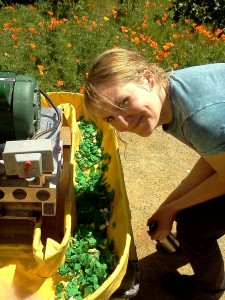Our Occupations (after the Occupations): Lara Durback
BY Thom Donovan

Lara Durback is next up in a series of posts for National Poetry Month regarding how writing and art practices have changed in response to the occupations. Previous respondents include Stephen Collis and Steve Benson; Richard Owens and Brian Whitener; Brian Ang and Ana Božičević; David Buuck; Suzanne Stein and Anna Vitale; Dan Thomas Glass and Lauren Levin; and Anelise Chen. The following two paragraphs contain part of the prompt that I provided to participants:
Something I am wondering about kind of broadly is how your practices might have changed since the beginning of the occupations, if we can mark this beginning in the fall of 2011 (the occupations obviously having their immediate precedent in the Middle East and Europe).
Do you think it may be possible to speak to this a bit? […] Succinctly, in a paragraph or two? Maybe it has had no perceivable effect, which is fine of course, and in which case you might talk about why it is important to maintain what you are doing parallel to (or beyond?) current social movements and political events.
LARA DURBACK
So "poet" has always been a default thing for me, I have been suspicious always of things that require me to relay the names of authors. Though I read, read, and read, I want poetry to be more about living and less about doing work inside. I am confused when things are not immediate. I have trouble remembering proper names and things on paper, even information in sequential order. Maybe it’s a selective aversion of my memory to everything representing hierarchy, or maybe I just remember things more through interaction, which is why poetry has fit in. If a piece of clothing I wear doesn’t have some weird meaning and story behind it, I don’t want to wear it. It’s kind of like the same with what I do now. I still want to do poetry, but I care even less about having a book or having a name. Is that bad? I care more about publishing, but it might be letterpress on trash with no names again and just REALLY good content.
Since October 10, 2011, (birth of Oscar Grant Plaza/Oakland Commune/etc. etc. whatever you wanna call it)… for me there has been a loosening of home, relationships, the physical ground beneath people in Oakland…. I wrote at length about this here: http://driftmagazine.org/?p=
I participated in this art show for ILSSA (Impractical Labor in Service of the Speculative Arts) in January: a bunch of artists display remnants from what they made every day for a year. Basically I ship out a box of scraps: mine was pieces of thread and scraps from making chapbooks at the beginning, and the last 3 months of the year were nothing but the scraps of Oscar Grant Plaza Gazette, digital misprints and over-prints from the daily paper I was scrambling to help put out. (It’s still going without me! Go Oakland!) So that shows how my practice changed.
I have become very serious of my support of people who may have higher stakes than I do. I now seem to hang out in very unpredictable clusters and think about how to make the clusters unpredictable again.
I described some of the things I’ve gone through standing in the streets for hours as “masochism lite” to my friend Lindsey Boldt. It is and it isn’t. It wouldn’t be masochism lite to people who grew up in different ways, because it would be proportionately different to what was experienced daily. People sometimes chastise a person for being too averse to “comfort.” Whose comfort? Whose security? Whose safety? What? For a while I had forgotten how bad the police are because I now live in California where everything is spread out. I used to know how bad they were in Philly where people are squashed together, but in grad school isolation land I forgot. I paid my literal huge debt to get my separate environment & job, but was grossly isolated. (But it’s worth it for the dedicated people I met there!)
I’ve seen many poets here in Oakland go through this freeze frame of not knowing what to do anymore, of seeing some sort of comfort of order shattered, of having to leave and not really return. Going back to the norm? I don’t know. I’ve seen a pattern among those who stay as having some deep pain in them, that allows them to return. And because the deep pain has always separated people by their smartness of knowing that there were hunches of better ways to live, now these people with deep pain are in the deepest joy and in these wonderful solidarity networks. I get joy from sitting in the courtroom with someone who might not have had another person there for them. This has proportionately more joy as the person’s background who you are supporting is the most different from your own. I get joy from hearing about others helping one another in these crazy situations, making sure people they don’t know are safe in a crowd, sitting in jail all night in the waiting room for a friend. People largely ended up there because they just want to be outside together or use some building or space in a more creative way, and these rude robots are whacking sticks at you and chemicals and it is so scary and awful but you realize it is much worse with police for people of color in poor neighborhoods where there is systematic living with police and the cycles of the justice system… and of course the solidarity grows when that injustice is acknowledged publicly in different ways.
Yes, I know it will feel less invigorating soon, it will not feel so joyful every minute out in the streets/parks/lots/gardens/
Thom Donovan lives in New York City where he edits Wild Horses of Fire weblog (whof.blogspot.com) and...
Read Full Biography

